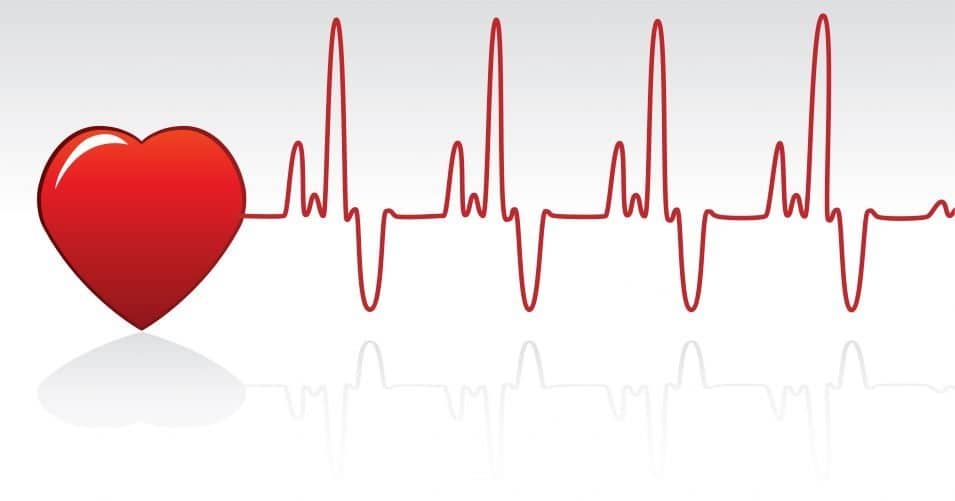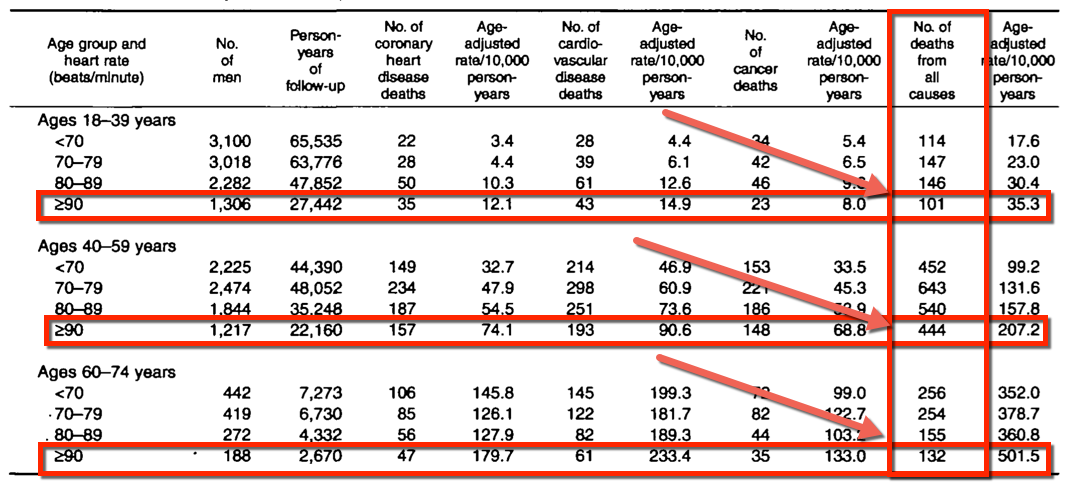
[cmamad id=”3043″ align=”center” tabid=”display-desktop” mobid=”display-desktop” stg=””]It’s popular to think that a slower heart rate is better for you.
The idea is that if your heart rate is slower, you’re healthier, and you will live longer.
But is that true?
Let’s find out.
Today’s study was done with thousands of men and women.
But I’m focusing on the chart for men today.
But the interesting thing is that in many studies, they get one thing really wrong with this.
 People who are sick often have a higher heart rate.
People who are sick often have a higher heart rate.
If you’re sick, and your heart is racing, then that’s clearly not a good thing for your lifespan.
Your heart racing is a symptom of your illness.
But what if you are fundamentally healthy?
If you are healthy, is it better to have a faster or slower heart rate?
So it’s important that we review this chart carefully.
On the left side are groups listed by ages, and there are three buckets.
They are grouped as ages 18 to 39, ages 40 to 59, and ages 60 to 74.
To make it easier for you to see what I’m talking about, I highlighted arrows next to what I want you to see.
And it has to do with the number of deaths from all causes.
This is what we call “all-cause mortality.”
[cmamad id=”3044″ align=”center” tabid=”display-desktop” mobid=”display-desktop” stg=””]
All-cause mortality is the gold standard of mortality numbers.
To explain, we’ll consider a fake study that’s looking at a blood pressure medication.
The new pill lowers blood pressure, but more people die who take the pill.
So, despite the fact that the new pill does actually lower blood pressure, it negatively affects the patient overall.
Clearly, this pill isn’t any good.
At least that’s what it should be.
Any treatment should lower all-cause mortality or else it’s not worth bothering with.
 So you’ll notice that people with a heart rate over 90 bpm (beats per minute) in all three age buckets live longer.
So you’ll notice that people with a heart rate over 90 bpm (beats per minute) in all three age buckets live longer.
They have a much lower death rate.
In people 18 to 39, only 101 people died from all causes during the study.
The group with the lowest number of people who died had the highest heart rate.
In people ages 40 to 59, 444 people died.
Again, the group with the lowest number of people who died had the highest, fastest heart rate.
And people ages 60 to 74, only 132 died.
Once again the group with the lowest number of people who died who had the highest heart rate.
It should be evident that a higher heart rate is desirable if you want to live a long healthy life.
But it’s also desirable to have a higher heart rate and not be sick.
You want to have normal blood pressure, exercise, be reasonably fit and healthy.
If you have those things, then you want to have a higher heart rate, not a lower heart rate.
So, what can raise your heart rate?
The reason that people’s heart rate gets lower and lower is that their metabolism slows down.
Raising your metabolism can help a lot.
It brings back your youth.
There are things you can do to support your metabolism.
You can take these things: allopregnanolone, small quantities of progesterone, thyroid, aspirin, methylene blue, niacinamide, thiamine, magnesium, and calcium.
You should restrict bad amino acids tryptophan, methionine, cysteine, and histidine.
Do these things and you’ll increase your metabolism… and raise your heart rate.

